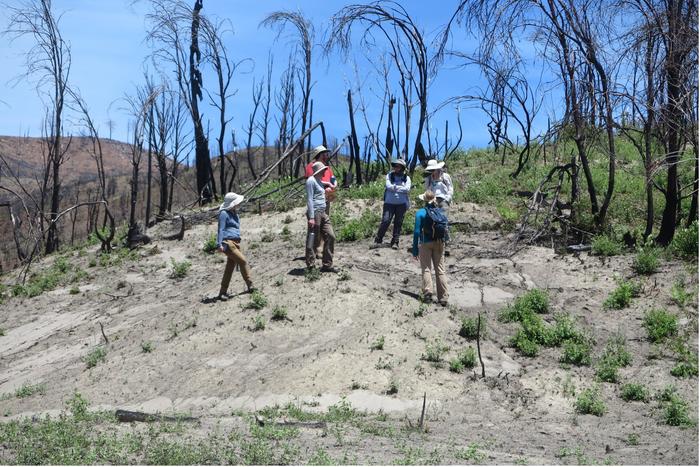From coastal redwoods and Joshua trees to golden poppies and sagebrush, California is a global botanical hotspot. It’s also a place confronted with extreme heat, wildfires and crumbling coastlines. The state’s natural beauty and history of pioneering conservation efforts make it a test bed for protecting biodiversity in the face of current and future climate change, argues a study led by the University of California, Davis.

Credit: Jim Thorne, UC Davis
From coastal redwoods and Joshua trees to golden poppies and sagebrush, California is a global botanical hotspot. It’s also a place confronted with extreme heat, wildfires and crumbling coastlines. The state’s natural beauty and history of pioneering conservation efforts make it a test bed for protecting biodiversity in the face of current and future climate change, argues a study led by the University of California, Davis.
Published July 29 in Proceedings of the National Academy of Sciences, the study, “Climate Change and California’s Terrestrial Biodiversity,” is part of a special PNAS issue on California sustainability. The study concludes that California’s 30 x 30 Initiative to preserve 30% of its lands and coastal waters by 2030, along with efforts to harmonize biodiversity conservation and renewable energy, is a promising step. It also highlights the need for California to shift away from its decades-long fire suppression policies and adopt fire strategies reflective of new fire regimes.
“California has had a history for over 100 years of being a leader in protecting the environment — from setting aside parks for people to climate adaptation,” said lead author Susan Harrison, a professor in the UC Davis Department of Environmental Science and Policy. “The threats are extreme and unprecedented, but California has always been a state where creative new solutions have emerged.”
California’s climate has become warmer, drier and more variable since the mid-1900s, the study noted. It examined major threats climate change poses to the state’s biodiversity and sustainability. These include the impacts of shifting plant biodiversity, land-use change, wildfire and renewable energy, and the policy responses to those challenges.
Hot spots on the move
The authors modeled the distribution of about 6,400 native plant species, identifying 15 regional plant biodiversity hot spots — from small areas, such as the Channel Islands, to vast parts of the Sierra Nevada and coastal ranges.
The models indicate these hot spots could lose an average of 19% of their native plant species by 2080 under current climate projections. California’s complex mosaic of microclimates means the state’s species could respond in a wide variety of ways to climate change. Some hot spots are expected to move toward the coast or upslope, while others remain or disappear.
Those stakes help outline the need for renewable energy projects to align with expected biodiversity shifts and needs. For example, Molok Luyuk, or Condor Ridge (formerly Walker Ridge), was slated for wind development projects along its blustery ridge despite its rich biodiversity before earning protection as part of Berryessa Snow Mountain National Monument.
“This paper is pointing out that we need to be proactive,” said co-author James H. Thorne, a research scientist with the UC Davis Environmental Science and Policy department. “We can’t be reactive like, ‘Oh, this wildfire is out of control. Oh, this species is disappearing. Oh, we misplaced where this green energy site should go.’ We have tools that can be used, some of which we discuss in this paper.”
A new mindset
Wildfire is a nearly year-round reminder of the state’s hotter, drier climate.
The authors write that fire management policies in California are less progressive than its policies for climate and conservation. The paper encourages the state to move away from its longstanding policy of fire suppression and adapt its strategies to use fire as an ecosystem management tool. State and federal agencies have set ambitious targets to increase the use of fire in land management but have been stymied by bans on prescribed fire motivated by safety and air quality concerns.
Harrison calls wildfire and climate change “game-changers” for how we think about conservation.
“Traditionally, ‘conservation’ had a restrictive meaning—we try to keep things the same. If anything goes missing, we try to put it back,” Harrison said. “But now, we require a different mindset. We need to be willing to modify traditional views of conservation. We need continual innovation.”
Additional co-authors include Rebecca R. Hernandez and Hugh Safford of UC Davis, Janet Franklin of San Diego State University, and Makihiko Ikegami of National Institute of Environmental Studies – Shiga, Japan.
Journal
Proceedings of the National Academy of Sciences
Method of Research
Data/statistical analysis
Article Title
Climate Change and California’s Terrestrial Biodiversity
Article Publication Date
29-Jul-2024



